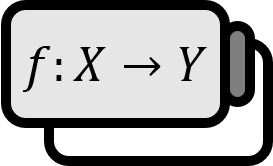What is a Special Function?
Description
Special functions, as called in mathematics, are usually the solutions to certain differential equations, defined by complex integrals, can’t be expressed by elementary functions, or have mathematically interesting properties. They often bear names of people, letters of the alphabet, or Greek letters, and it can be said that almost all named functions, except polynomial, trigonometric, exponential, and logarithmic functions, are referred to as special functions. As you can see from the explanation, whether a function is considered special or not is not conceptually and strictly distinguished.
Examples
Gamma Function
The Gamma Function is a special function defined by the following improper integral.
$$ \Gamma (x) := \int\limits_{0}^{\infty} t^{x-1} e^{-t} dt $$
It appears in many fields including mathematics and physics, and can be understood as an extension of the factorial’s domain from natural numbers to real (complex) numbers. Indeed, for natural numbers $n \in \mathbb{N}$, the following holds.
$$ \Gamma (n) = (n-1)! $$
List
Defined by Integrals
$$ \Gamma (x) := \int_{0}^{\infty} t^{x-1} e^{-t} dt $$
$$ B(p,q) := \int_{0}^{1}t^{p-1}(1-t)^{q-1}dt $$
Elliptic Integral of the Second Kind:
$$ E(\phi, k)=\int_{0}^{\phi}\sqrt{1-k^{2} \sin ^{2} \theta}d\theta $$
Defined by Series
$$ J_{\nu}(x)=\sum \limits_{n=0}^{\infty} \frac{(-1)^{n} }{\Gamma (n+1) \Gamma (n+\nu+1)} \left(\frac{x}{2} \right)^{2n+\nu} $$
Bessel Function of the Second Kind:
$$ N_{\nu}(x) = Y_{\nu}(x) := \frac{\cos (\nu \pi)J_{\nu}(x)-J_{-\nu}(x)}{\sin (\nu\pi)} $$
Bessel Function of the Third Kind:
$$ H_{p}^{(1)}(x) := J_{p}(x)+iN_{p}(x) \\ H_{p}^{(2)}(x) := J_{p}(x)-iN_{p}(x) $$
$$ \begin{align*} I_{\nu}(x) & =i^{-\nu}J_{\nu}(ix) \\ K_{\nu}(x) &= \frac{\pi}{2}i^{\nu+1}\left[ J_{\nu}(ix)+iN_{\nu}(ix) \right] \\ &= \frac{\pi}{2}i^{\nu+1}H_{p}^{(1)}(ix) \\ &=\frac{\pi}{2}\frac{I_{-\nu}(x)-I_{\nu}(x)}{\sin (\nu\pi )} \end{align*} $$
$$ \begin{align*} \operatorname{Ai}(x) &= \frac{1}{\pi}\sqrt{\frac{x}{3}}K_{1/3}\left( \frac{2}{3}x^{2/3} \right) \\ \operatorname{Bi}(x) &= \sqrt{\frac{x}{3}}\left[ I_{-1/3}\left( \frac{2}{3}x^{3/2} \right) + I_{1/3} \left( \frac{2}{3}x^{2/3} \right) \right] \end{align*} $$
$$ \zeta (s) := \sum_{n \in \mathbb{N}} n^{-s} = \prod_{p : \text{prime}} \left( 1- {p^{-s}} \right)^{-1} $$
Defined by Polynomials
$$ P_{l}(x)=\dfrac{1}{2^{l} l!} \dfrac{d^{l}}{dx^{l}}(x^{2}-1)^{l} $$
Associated Legendre Polynomials:
$$ \begin{align*} P_{l}^{m}(x) &= (1-x ^{2})^{\frac{|m|}{2}} \frac{ d^{|m|} }{ dx^{|m|} } P_{l}(x) \\ &=(1-x ^{2})^{\frac{|m|}{2}} \frac{ d^{|m|} }{ dx^{|m|} }\left[ \dfrac{1}{2^l l!} \dfrac{d^l}{dx^l}(x^2-1)^l\right] \end{align*} $$
$$ H_{n} = (-1)^{n} e^{x^2} {{d^{n}} \over {dx^{n}}} e^{-x^2} $$
$$ L_{n}(x) = \frac{1}{n!}e^{x}\frac{ d ^{n}}{ dx^{n} }(x^{n}e^{-x}) $$
